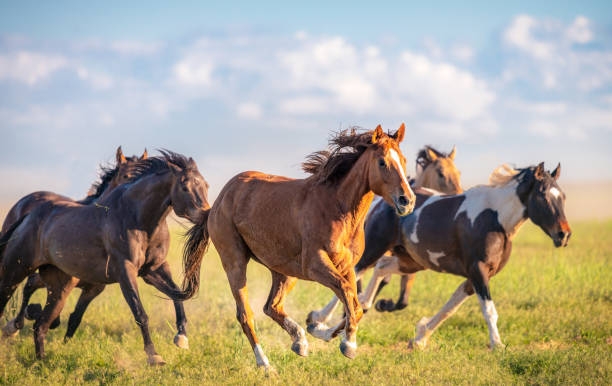11 things you need to know about horses
 Horses playing
Horses playing
All the information you require regarding horses
The non-horsey individuals in your life will love this post, I promise!
Everyone is aware of horses, but you’d be shocked at how little knowledge most people have about them.
There are many myths, and everyone has an opinion.
Here are some important horse facts to help clear up any misunderstandings, especially if you’re thinking about taking riding lessons or getting a horse for the first time.
1. They are big.Usually, the first thing people notice about a horse is how big it is.
This is understandable considering that even a little horse may weigh 800 pounds, and it just gets heavier from there! When it comes to strength and power, even little ponies can compete with us. We are little in comparison.
Which brings us to the most crucial realization regarding the interaction between horses and humans: we risk injury.
Perhaps it wasn’t even done on purpose. We will always be the ones who suffer the most when we are at the wrong place at the wrong moment.
Therefore, one of the first things we must do is learn how to operate with, around, and on horses safely. Both the animals and us must remain safe.
2. They also eat every singe time.Providing horses with as much access to fodder (meaning hay or grass) as feasible is one of the most important factors in determining their general health.
Nowadays, many of us have high-quality hay that really provides more nutrients and energy than is necessary.
Some horses self-regulate and eat infrequently throughout the day in little volumes.
We now have “slow hay feeders” that limit how much hay a horse can consume at once because they have a tendency to overeat, which can lead to harmful weight gain.
This allows even “easy keepers” to have hay available for extended periods of time.
3. Each of them has a distinct personality.In this respect, horses and people are similar.
Each horse has its own distinct personality. Some people work too hard. Some people are lazy and choose not to. Some people are jovial and cheeky.
These characteristics take some time to recognize, but if you pay close attention when listening, you will get familiar with every single one.
4. They are equally adept at learning as you are.It doesn’t follow that horses don’t learn just because they like to be quiet and prefer to be out grazing. They pick up on everything so quickly!
Their incredible capacity for learning enables us to train them for tricks, ride them, and put on spellbinding performances that will leave you speechless.
5. They can identify people.Some horses are very specific about who they consider to be their “peeps.”
Over the years, I’ve seen some horses that exhibit extremely standoffish behavior until they get to know you. It seems as though they are announcing “stranger danger” to all of their buddies.
Check out what happens when their favorite treat woman enters the barn if you don’t believe me. They definitely know where to find snacks! anyone who gives them food. someone kicks them out or lets them in. or someone who uses their feet. Or the vet they should stay away from!
6. They have an exceptionally long memory.They recall pleasant encounters. Despite the fact that it has been a while since they last saw one another, they still remember their horsey buddies from the past.
They also recall unpleasant incidents.
They do recall hard handling and any significant riding errors, it is true.
The good news is that horses don’t harbor resentments.
Literally, people move on and adapt the instant you can become better or change, or their environment does.
They will certainly recall everything, but you can be sure that they are prepared and looking forward to better times.
7. They are quite athletic.Every horse is athletic.
Though not all of them chose to display it!
Naturally, some people are more suited to particular disciplines than others, and some people require more conditioning and experience. But when necessary (like when there’s something to be terrified of), they can all move rapidly!
8. They are animals that herd.Horses have a social nature. They represent the idea of “safety in numbers” and live in a herd environment. This has implications for humans since it means that when we choose to associate with horses, we must recognize that they view us as herd mates as well. Therefore, we should review equine-style communication techniques!
9. Their social structure is solid.Each herd has a social structure.
The commander is there (or what has been termed as the “alpha” horse).
Then there is the second-in-command (the beta), and so on down the social ladder to the last horse.
Each horse in the herd yields to the ones ahead of him.
He must give way if a higher-level herd member wants to feed from the same spot he is in when he is eating at the round bale.
He must vacate his feeding position and go.
Because every time we are with our horse, we are actually acting as a two-horse herd, this is a really crucial idea for us humans to comprehend. Aside from the fact that we are people and not very big.
We had best be prepared to accommodate the horse’s every whim and desire if he believes that he is the herd leader between the two of us.
You can see how that can result in issues in the future. It becomes our obligation to develop clear, safe ways of expressing our herd rank (alpha).
The alternative is that (if they aren’t trained to respect your space) they might literally walk over you.
10. They see things differently than we do.The pupil of a horse’s eye is a horizontal slit, as may be seen if you look closely. In dim light, it can open widely and assumes an oval form. Numerous research have been conducted on horses’ vision and perception processes.
The horse’s vision is amazing since it spans from his nose to his tail on one side. And he has the ability to quickly swap eyes and see that much on the opposite side. Binocular vision also allows him to see what is right in front of him. He has a blind spot in front of his nose and in back of his tail, though. Our perception is completely the contrary. We have no blind spot since binocular vision allows us to look straight ahead, but our peripheral vision isn’t nearly as clear.
You can image how beneficial it would be for a prey animal to have excellent peripheral vision. Horses can see everything around them at any time, which allows them to flee immediately if they feel threatened in any way.
We can be more secure while riding or even walking on the ground if we have a solid understanding of spooking.
11. They have a keen eye for body language (apparently even human facial expressions).The horse can therefore detect your emotions in addition to all of your behavioral cues from the time you become visible to him.
Being able to maintain composure under pressure is one of the most important lessons we acquire as riders.
The quieter and more composed we can be, whether we’re in the saddle or on the ground, the more assured the horse will feel overall.
Source: Classfmonline.com/PetStudyMedia
Trending Entertainment

'I lost my way': Diddy begs judge for leniency on eve of sentencing
15:18
Bollywood superstar Shah Rukh Khan enters the billionaire club
15:13
Judge dismisses Drake’s lawsuit over Kendrick Lamar’s ‘Not Like Us’ diss track
01:40
Kid author Sarah Kittoe up for the highly coveted British Citizen Youth Award
08:47
My new song is inspired to correct ‘spiritual errors’ in the lives of people - Philipa Baafi
18:16
Ghana to celebrate the Life and legacy of Highlife legend Daddy Lumba on December 6
09:37
One iPhone led police to gang suspected of sending up to 40,000 stolen UK phones to China
15:14
Hiowe Gblaka family seeks restoration of ancestral lands in Dangme kingdom
17:13
Ko-Jo Cue shares how he rose to fame in Kumasi
14:42
My first recorded song was terrible – Ko-Jo Cue
14:33




